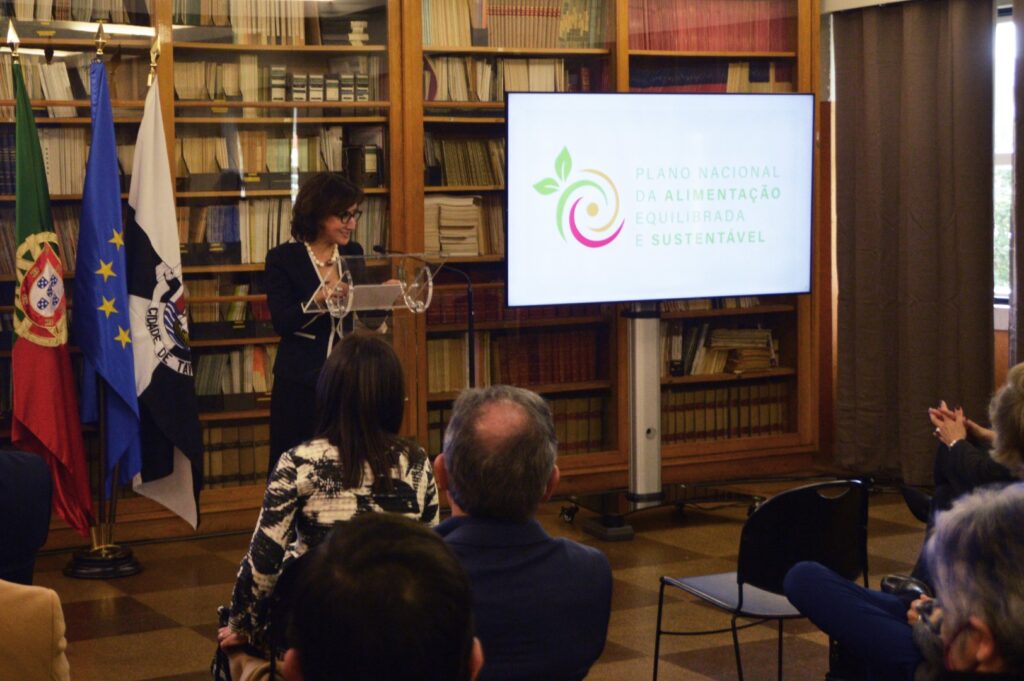Because «we are what we eat», the National Plan for Balanced and Sustainable Food (PNAES) was born, which the Minister of Agriculture officially launched today at Tavira, capital of the Mediterranean Diet in Portugal.
“If we make better choices about what we produce, we will be healthier, we will be able to retain more people, we will have greater generational renewal and, thus, we will reduce our ecological footprint”. Therefore, «we are going to have an agenda so that we can guide what we want to do in Agriculture for the next 10 years», said Maria do Céu Antunes in the presentation of the Plan, which took place this Wednesday, November 24, at the Center for Agrarian Experimentation of Tavira
This Plan is born within the scope of the “Terra Futura” Innovation Agenda, based on the promotion of the Mediterranean Diet, which corresponds to a healthy, balanced and diversified diet, taking into account the National Strategy for Food and Nutritional Security (ESANP).
«On the axes of consumption, production, Mediterranean diet, education and food literacy, this plan was created to be a stimulus to national and local production, to the adoption of more sustainable production and distribution systems, to stimulate short supply chains and local systems, valuing quality endogenous products», added the minister.
With the creation of the PNAES, it is intended "to raise awareness and advise consumers and the population in general on the adoption of a nutritionally balanced and informed diet", as well as alerting to "the importance of consuming endogenous and seasonal products, and of meat of small ruminants'.
"We want to encourage the consumption of national, regional and local products, in balance with the principles of the Mediterranean Diet", one of the objectives of this plan, to be fulfilled by 2030, is to "increase by at least 20% the adhesion to the its valorization and safeguarding, as a food system and standard characteristic of the national territory».
This plan also provides for the incorporation of social justice, food education and the fight against waste in the design of public policies for sustainable food, as well as stimulating the planning of actions on the ground to provide collective, public and private food, with seasonal agricultural products.
"We also want to specify the modalities of association between regional and local authorities, in order to guarantee the territorial anchoring of the Plan, encouraging the development of short circuits and geographical proximity", explains the official.
The minister also announced the opening, in December, of a Notice entitled “National Rural Network – Observatory of Agriculture and Rural Territories”, with five million euros to be used in two years, which aims to “provide territories with technicians, nutritionists and agronomists, capable of implementing an action plan to raise awareness and advise consumers and the population of rural territories, with a view to promoting this PNAES».
The ambition is «to be able to support, at the regional level, 23 initiatives», and for this it is necessary that each Intermunicipal Community articulates itself with Local Action Groups, who decide on a “leader of the line” and create an action plan, «joining, by for example, other associative movements or farmers, so that they can then build a bridge with school canteens or with IPSS, to create these short circuits and promote healthy and sustainable food».
Maria do Céu Antunes believes that, «despite this being a pilot project», it will «make all the difference».
The opening of another notice was also announced, in March of next year, to support the installation of traditional permanent crops, such as the carob trees in the Algarve. "This is the opportunity to make a difference in these territories, based on investment capacity."
The Minister of Agriculture also referred that «the Government decided to make a «fairer distribution» of European support, having increased «income support in territories vulnerable to rural fires by 31% and, here in the Algarve, by 32%».
In this way, «our farmers will be able to increase their income and to be able to carry out agriculture capable of valuing work with regional varieties», in order to «stimulate the Mediterranean Diet» and «appreciate the National Food Plan Balanced and Sustainable», he concluded.





















Comments